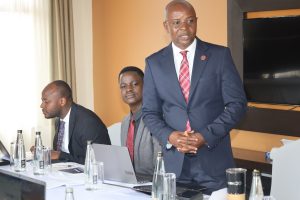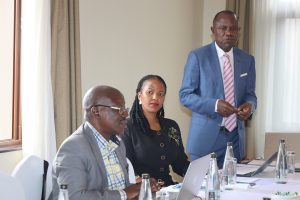The College of Business and Management Sciences today hosted a diverse gathering of government officials, policymakers, researchers, and other key stakeholders for the inception workshop of the “Land Market, Use Patterns, and Relations in Uganda” study. The event, held at Mestil Hotel in Kampala, was inaugurated by Honorable Minister of Lands, Housing, and Urban Development, Hon. Judith Nabakooba, alongside Prof. Edward Bbaale, who represented the Vice Chancellor of Makerere University.

In his remarks, Prof. Bbaale underscored land as a pillar of Uganda’s economy, essential to sectors such as agriculture, infrastructure, and housing. He highlighted the collaborative spirit of the workshop, where experts would engage in research-driven strategies to address Uganda’s complex land policies.

Prof. Eria Hisali, Principal Investigator for the study, discussed the critical issues arising from current land policies. Challenges such as limited tenure security have led to conflicts over land ownership, particularly in areas under customary tenure systems. He emphasized that “inadequate land registration creates uncertainty in ownership, making it difficult for landholders to confidently invest in long-term development.” Prof. Hisali further noted that restricted access to secure land titles hinders many Ugandans from using land as collateral for business growth, ultimately limiting economic opportunities.
Hon. Nabakooba detailed the government’s initiatives to address land management challenges, including the establishment of 22 zonal offices and the rollout of an electronic Land Registry (the Land Information System) to enhance efficiency and security in land administration. While acknowledging progress, she stressed that major challenges remain, including historical land injustices, overlapping claims, and capacity constraints in land governance. Approximately 70% of Uganda’s land remains under customary tenure, which is often insecure. She emphasized that while 30% of Uganda’s land is titled, providing greater security and investment potential, the untitled majority poses risks to sustainable development and economic growth.
The workshop aims to bridge these gaps, generating evidence-based insights to guide land policies that align with Uganda’s goals for economic growth, social equity, and environmental sustainability. This study aligns with the government’s commitment to improving land governance for sustainable development, supporting access to land for all citizens. Through this initiative, Makerere University demonstrates its dedication to impactful research that addresses the country’s most pressing development challenges.

